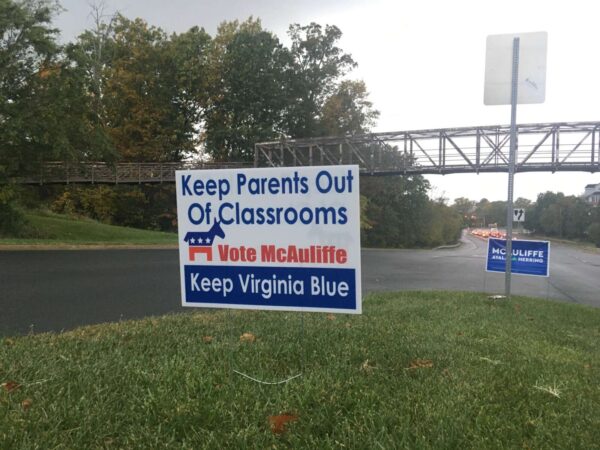
A possible fake campaign sign spotted in Herndon saying “Keep Parents Out Of Classrooms” and “Vote McAuliffe” was not sanctioned or distributed by Democratic gubernatorial candidate Terry McAuliffe’s campaign or the Democratic Party of Virginia.
The controversy arose this past weekend when Matt Lang, Republican challenger for the delegate seat in the 36th District, tweeted about the sign that uses a phrase that Republican candidate Glenn Youngkin has latched onto during the gubernatorial campaign.
This is how @TerryMcAuliffe and @VAHouseDems think of us as parents. They tell you to “shut up, sit down, and pay your taxes”. I say, NO! My child, my school, my voice! Let’s tell them to pound sand on November 2! Win with @GlennYoungkin and @vahousegop pic.twitter.com/iJLrgxAybW
— Matt Lang (@LangForVA) October 24, 2021
It appears the aim with the sign is reverse psychology, promoting that Democrats and McAuliffe want to “keep parents out of classrooms” while asking voters to “Keep Virginia Blue.”
The sign also does not include a federally-required disclaimer identifying who or what organization paid for them.
Reston Now has independently confirmed that, as of Monday night, the sign at Frying Pan Road and Burrough Farm Drive was still there.
However, both Democratic Party of Virginia and McAuliffe’s campaign have denied their involvement with the sign or others that have apparently been spotted in Northern Virginia.
“These signs are not ours. They were not sanctioned or distributed by Terry for Virginia or the Democratic Party of Virginia,” Manuel Bonder, a spokesperson for the Democratic Party of Virginia, wrote in a statement to Reston Now.
“This is not a sign distributed by us,” a spokesperson for the McAuliffe campaign told PolitiFact. “It’s not our sign.”
Lang told Reston Now that he also has spotted the same sign near Fox Mill Road and heard of other signs near McLean.
“I have no idea who put them up,” he said. “But they echo what [McAuliffe] has been saying at the debates and during the campaign.
At this point, it remains unclear who put the signs up as they’ve garnered some national attention.
Reston Now has reached out to the Youngkin campaign, but has yet to hear back as of publication. Reston Now has also reached out to the Virginia Department of Elections about if they could provide more information on the legality of such signs, but that information has yet to be provided.
With less than a week before the election for Virginia’s next governor, McAuliffe holds a very narrow lead in the polls over Youngkin.
David Taube contributed to this story
 This is an opinion column by Del. Ken Plum (D), who represents Reston in Virginia’s House of Delegates. It does not reflect the opinion of Reston Now.
This is an opinion column by Del. Ken Plum (D), who represents Reston in Virginia’s House of Delegates. It does not reflect the opinion of Reston Now.
I hold it that a little rebellion now and then is a good thing and as necessary in the political world as storms in the physical,” Thomas Jefferson wrote to James Madison in 1787. “It is a medicine necessary for the sound health of government.” Mr. Jefferson would have been pleased with the voter rebellion of 2019 that shifted power in both houses of the General Assembly for the first time in two decades.
With all the history-making details of the outcome of the 2019 elections, some of what happened is a repeat of past events from which there is a great deal to be learned. In my first term in the House of Delegates in 1978 there were 78 Democrats; that number dwindled to 47 in 2000 when Republicans assumed control of the House.
Republicans had been treated shabbily under Democratic majorities, and they never passed up an opportunity to point out the arrogance and unfairness of the Democratic majority. For decades Democrats had not put Republicans on committees that met.
When Republicans took over the majority in the House, they told stories over and over of Democratic abuses of the past to justify minimizing Democratic participation in the legislative process. Republicans were doing the very things about which they had complained for decades. To the victor goes the spoils. It was time for revenge
Republican campaigning to take the majority never fully transitioned to fairly governing the Commonwealth. Retribution was sought for past grievances. I and many others were removed from major committee assignments. Committee operations were changed to keep Democratic bills bottled up with no recorded votes. In all ways the Republican majority was no better than the Democratic majority had been.
Some examples of abuses: Gerrymander districts to protect Republicans and to reduce chances of Democrats getting elected; Stack committee membership to ensure that their bills were the only ones to get passed; Add subcommittees without adhering to proportional membership or recorded votes to dispose of bills on gun safety, ERA ratification, or nondiscrimination in a way to leave no fingerprints or blame.
Democratic legislators have many stories they can relate about their suffering over the last couple of decades under Republican dominance. The campaigns that just ended were full of dirty tricks. Democrats may well be in the mood to seek revenge; payback can be so sweet.
I believe, however, Democrats must act as though we have learned from past mistakes. Winning the majority puts Democrats in the position to bring about critically needed reform in the legislative process and to act on legislation for which they were not able to get a hearing over the last couple of decades.
Flipping the General Assembly should be more than a color change from red to blue: it needs to be a change to a more open and transparent government. I believe that voters do not want political wrangling; they expect reform of the way business has been done in the past. The majority must provide leadership for meaningful reform while ignoring temptations for revenge. A history of bad deeds should not be repeated.
File photo
 This is an opinion column by Del. Ken Plum (D), who represents Reston in Virginia’s House of Delegates. It does not reflect the opinion of Reston Now.
This is an opinion column by Del. Ken Plum (D), who represents Reston in Virginia’s House of Delegates. It does not reflect the opinion of Reston Now.
Advocates on behalf of cleaning up our environment got further strong evidence of the need for “bold, swift action on behalf of our environment,” a phrase used by many who have recently written letters to me. A 1,500-page report based on thousands of scientific studies by hundreds of international experts has concluded that “humans are transforming earth’s natural landscapes so dramatically that as many as one million plants and animal species are now at risk of extinction posing a dire threat to ecosystems that people all over the world depend on for their survival.”
The Intergovernmental Science-Policy Platform on Biodiversity and Ecosystem Services that produced the report for the United Nations found that “piecemeal efforts to protect individual species or to set up wildlife refuges will no longer be sufficient.” Instead, they call for ‘transformative changes’ that include curbing wasteful consumption, slimming down agricultures and cracking down on illegal logging and fishing.” The writers of the assessment are hoping that policy makers will see the importance of nature to the health of people and local economies and will able “to strike a more careful balance between economic development and conservation.”
As Virginia advocates point out in their plea, “it will now be up to the 2020 Virginia General Assembly to stand up for our health and the environment, for clean energy, and to protect Virginians from the ravages of climate change of which we are already feeling the effects.” The most recent session of the General Assembly demonstrated that the legislators in charge can make all the difference. In a strictly partisan vote, the Republican majority had language inserted in the budget that restricts the Commonwealth’s ability to participate in the Regional Greenhouse Gas Initiative (RGGI) that will be a critical avenue for reducing carbon emissions in the state and addressing the negative effects of climate change on the health and safety of the people.
While the language by the Republicans was not subject to a line item veto by the Governor because of past court decisions, the Governor nonetheless has pledged to move forward with new regulations much the same as would be part of RGGI to make significant reductions in carbon pollution from fossil fuel fired power plants. The Governor has made it clear that the budget he prepares next year will delete the Republican language. With the probable change of control of the House of Delegates and State Senate this year the language will not be carried forward in future budgets.
It is unfortunate that the actions of the Governor on this and other items in the budget have been sharply criticized because of a misunderstanding on the part of many that the Governor’s line item veto power is not unlimited — supported by court decisions but still controversial. The good news is that the Governor has indicated in many other actions that he recognizes the need for bold and swift action to protect our environment. I look forward to working with him in greatly enhancing Virginia’s protection of the environment.
File photo
Nearly one month away from the special election for the 86th District seat, the Fairfax County Republican Committee will hold a meeting on Saturday (Jan. 19) to nominate a candidate.
Yesterday (Jan. 14), the committee put a call for a mass meeting to nominate a Republican candidate for the now-State Sen. Jennifer Boysko’s vacated seat, which represents parts of Fairfax County and Loudoun County.
The meeting is scheduled to take place at the Fairfax Christian School at 22870 Pacific Blvd in Dulles with a start time of 9 a.m. Only Republicans in the 86th District can participate in the mass meeting, according to the website.
Candidates have until 9 a.m. on Friday (Jan. 18) to provide a written statement of intent to Committee Chairman Amanda Morris.
The special election is set for Feb. 19.
On Saturday (Jan. 12), Ibraheem Samirah was nominated to represent the Democratic Party.
 This is an opinion column by Del. Ken Plum (D), who represents Reston in Virginia’s House of Delegates. It does not reflect the opinion of Reston Now.
This is an opinion column by Del. Ken Plum (D), who represents Reston in Virginia’s House of Delegates. It does not reflect the opinion of Reston Now.
On August 30, I and my colleagues in the General Assembly will return to the State Capitol in Richmond at the request of Governor Ralph Northam to un-gerrymander eleven House of Delegates districts that have been found by a panel of federal judges to be unconstitutional. The court’s action was based on a finding that the districts as drawn violated the equal protection of the law afforded to everyone by the United States Constitution.
In the redistricting of 2011, the Republicans who had a majority in the House of Delegates packed African Americans in the Richmond-Hampton Roads regions into the eleven districts that have been found unconstitutional. From a partisan perspective the packing resulted in African Americans who historically vote Democratic to be limited in their influence over voting outcomes throughout the region. From a legal perspective African Americans were denied their constitutional protection from the gerrymandering that put them into fewer districts over which they might have an influence.
The requirement to un-gerrymander legislative districts in Virginia is not new. Most recently and earlier this year the congressional districts in the Richmond-Hampton Roads region were found to be unconstitutional. When the districts were redrawn Democrats won an additional congressional seat with an African American candidate.
Unraveling a partisan gerrymander is not easy. With the congressional districts, the courts had to redraw them because the General Assembly could not come to an agreement as to how it should be done. There is serious concern as to whether the General Assembly will be able to redraw the district lines for the House of Delegates or whether it will revert to the courts for correction. With any of these revisions there are likely to be winners and losers, and legislative bodies have not shown the ability to draw lines that will disadvantage a member(s) in re-election. With the congressional redistricting, for example, one member of Congress lost a seat to the African American candidate who ran in a newly redrawn district.
To correct the clear racial discrimination in the eleven districts that have been found to be unconstitutional, it will be necessary to redraw more than thirty district lines as currently constituted. As the redrawing takes place some voters will find themselves in new districts as will some incumbent legislators. The election outcomes are likely to be different as the racial bias of how the districts have been drawn is removed.
The courts have not taken up cases of gerrymandering when allegations of partisan discrimination are alleged. The courts are interested in issues of constitutional protections most often found when racial discrimination can be shown. Issues of removing partisanship from the redistricting process, as some have expressed it–to have the people choose their elected representatives instead of legislators choosing their constituents–have been resolved in other places by having an independent, nonpartisan commission draw the lines. I first introduced a bill to establish such a commission in Virginia in 1982 and have introduced such a bill many times.
The General Assembly must carry out its responsibility to undo the racially discriminating districts that currently exist. Additionally, it should take the next step to put an independent non-partisan commission in place.
File photo
In a mix of party and protest, people have gathered for nightly protests outside the White House for three weeks. Acting as the backdrop of the crowd is Herndon-Reston Indivisible, a community action group that aims to push back against President Donald Trump.
Clad in neon yellow shirts, group members hold brightly lit orange letters spelling out the words “treason,” “puppet” and liar. For the last 23 nights, they’ve gathered at Wiehle-Reston at 6:30 p.m. to join in the protest, called “Kremlin Annex.”
Protests began on July 16 after Trump appeared to agree with Russian President Vladimir Putin, who denied interference in the 2016 U.S. presidential election.
Kremlin Annex plans to be there as long as Trump is in office. On average, seven people from the organization join the nightly protest, according to Joanne Collins, a member of Herndon-Reston Indivisible and co-leader of the group’s elections committee.
Collins says the environment is full of energy. Earlier this week, Rosie O’Donnell, an actress and TV personality who has been vocal against Trump, stood alongside Broadway musicians for the protest.
“It’s kind of like a party. It’s led by a young guy and they have bagpipes and have even had a mariachi band,” she said. “It’s been raining a lot and we’ve attended rain and shine.”
Herndon-Reston Indivisible was formed by Heidi Zollo and Carrie Bruns following the 2016 presidential election. The organization rallies on ten issue groups, including topics like the environment, immigration and election activities.
Photos via Herndon-Reston Indivisible
 This is a commentary from Del. Ken Plum (D-Fairfax), who represents Reston in Virginia’s House of Delegates. It does not reflect the opinion of Reston Now.
This is a commentary from Del. Ken Plum (D-Fairfax), who represents Reston in Virginia’s House of Delegates. It does not reflect the opinion of Reston Now.
One of the first tasks in a new session of the Virginia General Assembly is to decide who is going to run the show. In the Senate of Virginia, the decision is made by the voters of the Commonwealth when they elect the Lieutenant Governor whose principal duty is to preside over the Senate. In the House, the Speaker of the House is the presiding officer who is elected by the members of the House.
The political party with the most members has control of the House and elects the Speaker. Republicans control of the House is 51 to 49 this session, a sharp drop in the 66-34 control of recent years. The closeness of the balance of power led to some meaningful discussions that should result in more transparency in the operation of the House.
My interest in becoming the presiding officer of the House by being elected Speaker was well known. Once the two disputed delegate elections where decided in favor of the Republicans there was no way I could reasonably expect to win. Only the Republican who had worked in his party and in the legislature for decades was nominated, and he was elected unanimously. That helped the session get underway in a cooperative spirit. There will be ample opportunity for debate when the many bills that reflect the issues before the General Assembly are considered.
What does a Speaker wannabe do when his party does not gain control of the legislative body? I have decided for myself that if I cannot be the formal Mr. Speaker of the House of Delegates then I can return to my role as Mr. speaker (small “s”) speaking out on tough issues that some may want to duck, and I can speak out on institutional practices that are not transparent or fair.
In this way, I can best serve my constituents and the long-term interest of the Commonwealth. I can also serve as a mentor to the many new exciting members that are joining the House of Delegates, and I can help to reduce any feelings of intimidation they might be experiencing. Certainly the legislature provides experiences that are not replicated in any other role in life.
The techniques of mass communication through phone calls, postcards, rallies, opinion writings, and other practices that were so successful in helping to get candidates elected can be utilized in the legislative process to help influence the outcome of legislation. I have already been seeing groups shifting from advocacy for individual candidates to advocacy for issues. On issues like expansion of health care and independent redistricting, a strong public voice and advocacy are necessary for success.
There will be more opportunities for the public to follow the legislature in real-time this year than ever before. Video streams of meetings of House Full Committees can be accessed online. Download an instruction sheet at Live Stream Instructions.
You can contact me in Richmond by using regular email, [email protected], or by calling my local telephone number 703-758-9733 that will ring in my Richmond office.
File photo
 This is a commentary from Del. Ken Plum (D-Fairfax), who represents Reston in Virginia’s House of Delegates. It does not reflect the opinion of Reston Now.
This is a commentary from Del. Ken Plum (D-Fairfax), who represents Reston in Virginia’s House of Delegates. It does not reflect the opinion of Reston Now.
The General Assembly convened for its annual session on Wednesday. Hopes that the historic election results of November brought forth have dimmed somewhat as the drawing of lots to settle the results of the final district race gave the Republicans a one-member advantage to control the House of Delegates. Many wonderful people have been at work on the terms for a power-sharing agreement.
Now the incentives for such reform have diminished with the acceptance of a disputed ballot that led to the Democrats losing a seat that would have made for a partisan tie in the House and much more likelihood of a power-sharing arrangement. There is likely to be some reform of the process but not a change of one-party dominance that has thwarted efforts to deal with some major issues.
I continue to be impressed with the make-up of the House of Delegates as the new members are reflective of the people of Virginia. For the first time in our history women will make up half the membership of the Democratic caucus. The new members bring wonderful backgrounds, expertise, and life experiences that will bring a greater sense of reality to legislative debates. We will make progress on more issues for sure but maybe not as great as I led people to believe when election results were announced.
One of my greatest concerns is that the thousands of men and women who chose to take part in the electoral process for the first time in ways other than just voting not become disillusioned with the process and retreat from it. Make no mistake about it: the outcomes of the legislative and state-wide races in Virginia in 2017 were historic. Voter turnout in these races was greater than in any other year with the same seats to be filled. The solid Republican majority of 66 to 34 was reduced to 51 to 49. Senior members of the majority with more than adequate monies to finance their races lost to a public uprising. All involved in this process can rightfully be proud. All that activity has been focused on campaigning; now we must turn to governing.
I hope that all those who campaigned so hard for candidates will identify one or perhaps several issues upon which they can focus their attention and with the same techniques of phoning, social media, door knocking, rallying and more can help persuade members of the legislature to vote responsibly on the issues. Just as we sold voters on candidates, we need to sell legislators on important issues. Such campaigns can make a difference in the outcome of legislation.
Political parties on both sides will be eager to take credit for the outcomes of elections in which they participated. Without a doubt, the success of elections this cycle came from the women and men who volunteered–sometimes in organized groups or acting as individuals–that made the difference. Political parties can learn from these people. Please do stay involved, for your participation can make such an important difference as the General Assembly lumbers along.


